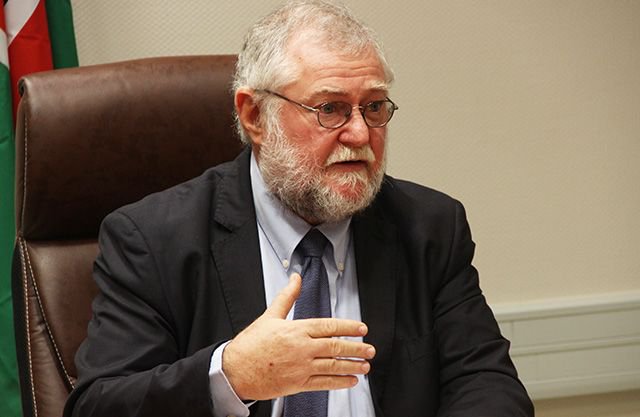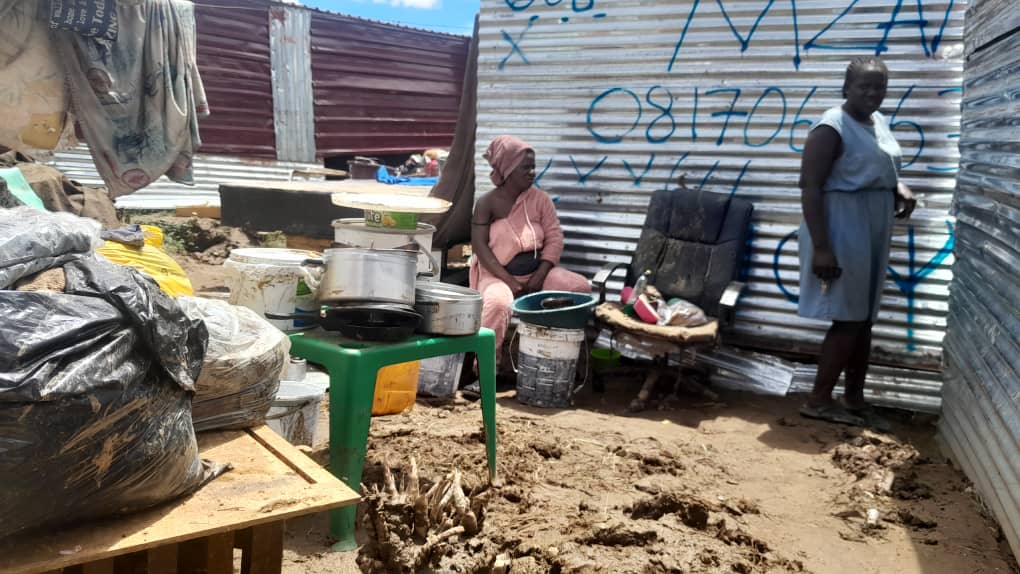– Minister of agriculture, water and land reform Calle Schlettwein at the national validation workshop on resettlement criteria
I am pleased to address you today, our key stakeholders, whom I know represent various communities and organisations.
The national validation workshop is significant and needed after the regional consultations on the national resettlement criteria were concluded.
However, this workshop is not just another consultation, it brings the consultation process on the criteria to an end. It shares inputs as received from the regions on the revised national resettlement
criteria.
The finalisation of this criteria is required, it is an indispensable piece of policy development within the overall reviewed National Resettlement Policy.
The aspiration was clearly spelled out during our second National Land Conference in October 2018. As a nation, we are developing a set of new criteria, because we have collective key priorities for target-driven land redistribution, which ensures
that land is allocated transparently, along the policy guidelines we have agreed on collectively.
Land redistribution is a high priority, and yes, it is a sensitive issue for all Namibians.
The overall objective of land reform remains to correct the injustices of the past colonial regimes – both the German and South African apartheid regimes.
Namibians should see it as a fountain of peace and unity in which our traditions and customs are anchored, and through which our dignity is restored.
To achieve those aspirations, these criteria are developed in such a way that land is allocated to satisfy needs-based redistribution – in other words, dispossessed communities, who must be treated preferentially and therefore a 70:30 ratio.
It means that 705 of resettlement beneficiaries must originate from the region in which the land to be resettled is located, and 30% is available to disadvantaged Namibians from elsewhere.
Secondly, this is to reach out to people living in corridors and the unemployed youth. The resettlement policy, before the review, had some shortcomings and they are now addressed.
Unintentionally, farmworkers who had worked on farms acquired for resettlement, were left homeless and they need to be accommodated. A programme for generational farmworkers will address this.
Further, some group settlements caused congestion and consequently rendered those farms unproductive. Unfortunately, poverty was perpetuated in both cases. Our view is to ensure people in different categories are all catered for in a balanced manner.
Productivity of land on which resettlement occurred is the second priority. Resettlement must result in decent livelihoods for the resettled persons, not in poverty. The criteria therefore must ensure that the land remains or gains productivity. Once that is ensured, the final step of restoring ownership can be taken by facilitating free hold titles to resettled people. We understand the call and the urgency to implement the resolutions of the second
National Land Conference, such as the immediate implementation of the revised National Resettlement Policy.
We have made good progress and finalised the review of the Commercial (Agricultural) Land Act and the Communal Land Reform Act and consolidated them into one bill, which is now finalised after some delays in drafting it.
It will be tabled in parliament during its next session in 2025.
The revised resettlement criteria are part and parcel of the reviewed National Resettlement Policy, which was approved after a discussion in the National Assembly, and were subsequently presented to the Land Reform Advisory Commission (LRAC) for scrutiny and editing.
It was thereafter presented to the regional stakeholders for input and comments. These consultations indicate clear dedication to a responsive land reform policy. I implore all stakeholders, who
provided input and comments, to finalise the revised resettlement criteria.
As the ministry, we value your contributions, inputs and comments. We request that we as stakeholders validate all inputs to enable the finalisation and implementation of the resettlement criteria.
As I indicated earlier on, we have invested sufficient time with all our critical stakeholders in consultation, and it is mow time to finalise the criteria. The true value of the reviewed resettlement policy and criteria will realise only after they are implemented.
Once the criteria are finalised and adopted, the ninistry will move to implement the allocation as per the three proposed models which are, the high economic value model (large-scale farming), moderate economic value model (medium-scale farming), and low-economic value model (social welfare economic value
model).
These models will serve as a guiding tool in allocating land to Namibian citizens in accordance with their various land needs and demands.
Many of us here today lived and or have experienced colonial subjugation in one way or another, which has brought about skewed land distribution which my ministry is determined to correct until balanced land redistribution is achieved.
It is for this reason that land reform is a high priority in Namibia’s policy landscape. It is our contention, however, that high priorities must not only be talked about, they must be appropriately resourced.
The current rate of funding land reform falls far short of what is needed to implement meaningful land reform. For the successful
implementation of the new resettlement policy, budgetary allocations must be improved significantly in future.
This workshop should be taken seriously. The communities are waiting for the implementation of the new policy and its criteria. The communities we are representing here today are legitimately hoping for speedy implementation. Therefore, may we request all of you to put heads together so that we can validate and ratify the revised resettlement criteria as a matter of urgency.
I want to thank all internal and external stakeholders for their contributions during the regional consultations which assisted us, the ministry, to arrive at this validation workshop. The finalisation of the resettlement criteria is in your hands for validation during this workshop. Director of ceremonies, in conclusion, allow me to officially open the workshop and wish you the best in your deliberations.
Stay informed with The Namibian – your source for credible journalism. Get in-depth reporting and opinions for
only N$85 a month. Invest in journalism, invest in democracy –
Subscribe Now!








